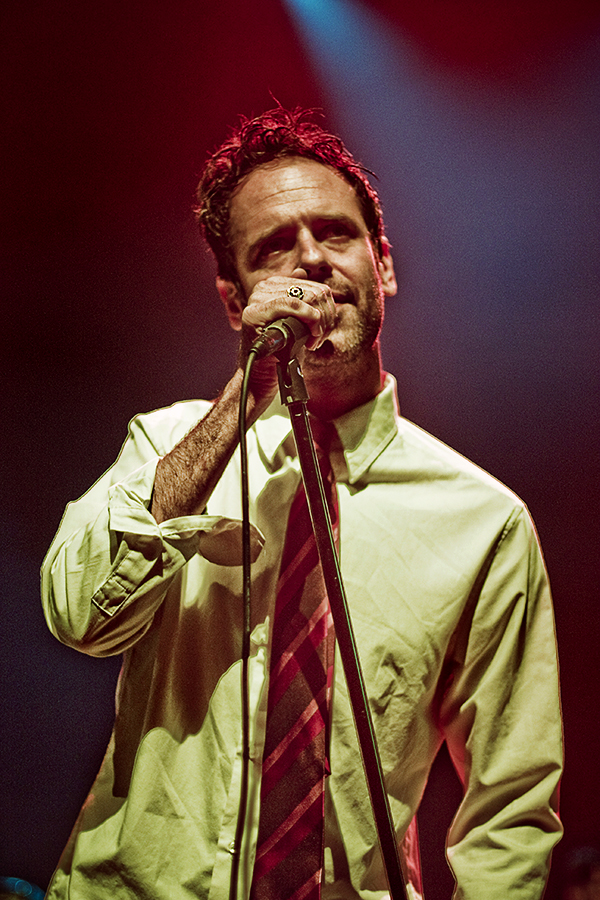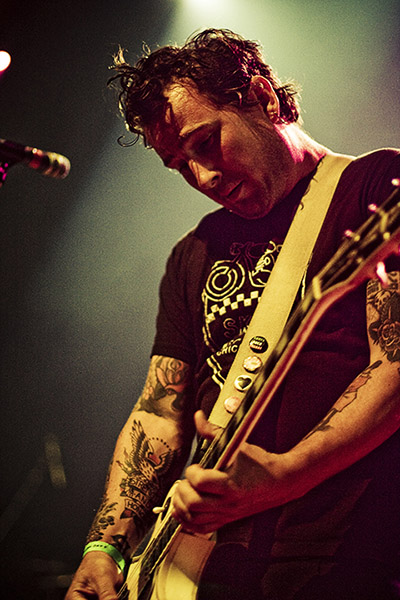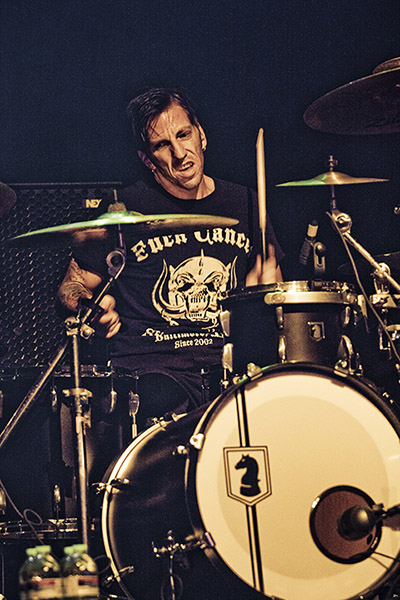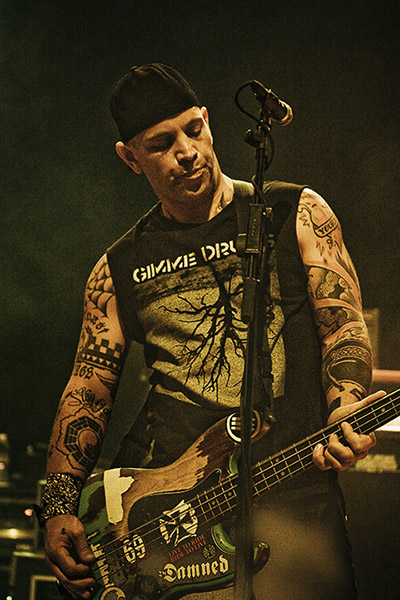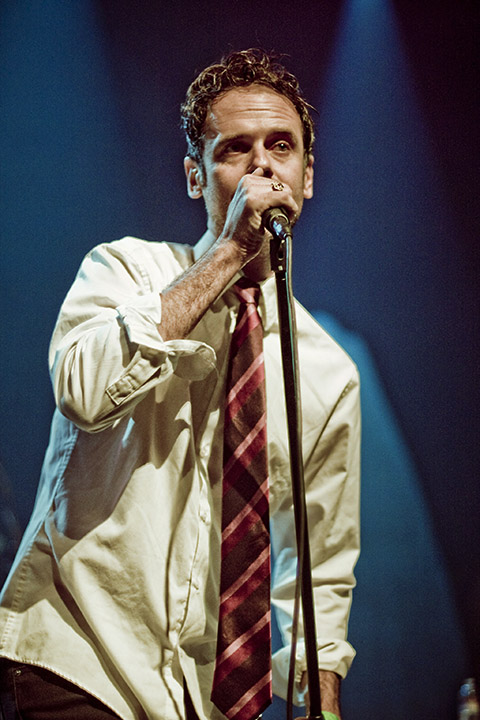Photos by Katie Hovland
Over the past two decades, The Bouncing Souls have evolved to become one of the most prominent bands in American punk rock. By consistently delivering quality music, they’ve established a devoted and sizeable fan base. Perhaps most importantly, they routinely emphasize integrity, both with their songwriting and how they choose to manage the band. This interview was conducted just before their set at Riot Fest 2010 and we spoke with three of the four members, (guitarist Pete Steinkopf, bassist Bryan Kienlen and drummer Michael McDermott).
Bill – Last year marked the 20th anniversary of The Bouncing Souls. In order to celebrate, you guys released one song per month and made them available for download via your record label. These songs were then compiled onto a series of EPs and ultimately as a proper album, called Ghosts on the Boardwalk. What made you want to try a different approach and are you happy with the outcome?
Pete – Yeah, we’re absolutely happy with it. We just wanted to do something different for our anniversary. We threw around a bunch of ideas, but that’s kind of what we ended up with. We were actually in Chicago, playing a show, and we all went out to dinner and that’s where the idea started from.
Bill – Prior to Ghosts on the Boardwalk, your last five full-lengths were released by Epitaph. Was it a difficult decision to leave such an established label and move forward without their assistance?
Bryan – It was all part of the same attitude of just wanting to do everything differently. It was all part of the same mood, really.
Bill – Musically speaking, Ghosts on the Boardwalk embraces some of your band’s signature sounds, while simultaneously venturing into uncharted territories. Did you plan for this sort of result or did it occur as the writing process unfolded?
Bryan – Unfold is a great word to describe the songwriting process. We didn’t really have much of a plan going into it and typically we don’t do a lot of planning beforehand. It must have come up once or twice though. I think it was when we wrote “Badass” that it felt like we were writing “East Coast! Fuck You!” or something. Otherwise, stuff really just kind of falls where it does.
Bill – From a lyrical standpoint, this album features familiar themes of great friendships, loyalty and love. In some ways, it comes across as more optimistic and introspective than before. Is it fair to say that there was a primary sentiment you were trying to express?
Bryan – Again, things like that you just kind of see in hindsight. It’s not something you could plan even if you wanted to.
Bill – Ghosts on the Boardwalk is The Bouncing Souls’ second collaboration with producer Ted Hutt. What do you enjoy most about working with him?
Pete – He constantly drives you to do better and to do more. You’ll come up with a whole song and he’ll make it better in every way. He doesn’t stop doing that until the record is totally done.
Bill – Do you have a favorite song off Ghosts on the Boardwalk?
Bryan – I think my current favorite is probably “Dubs Says True” or maybe “Never Say Die / When You’re Young.”
Bill – Having previously played Riot Fest in 2008, what are you looking forward to in terms of playing the festival again?
Bryan – What makes it fun is definitely the variety. Every time we do this it’s a totally different lineup. It’s a lot fun to be part of a stacked bill, somewhere in the middle of the show. It’s kind of a fun feeling for us. It seems like we’re always doing our own headlining tour.
Michael – When you’re the last band it’s like the show ends, you change and then it’s usually just a bunch of dudes sleeping.
Bryan – Exactly. You get off stage, you’re so fired up and you want to have drinks, hang out and be at a show, but it’s over. This is great. We can watch The Circle Jerks when we’re done.
Bill – You guys recently embarked on a tour with Bad Religion and later this year you’re headed to Australia with Hot Water Music. Does playing with such established bands give you any extra motivation?
Bryan – Yeah, you can definitely learn something from all those guys. We’re also touring with NOFX coming up, which is another one you could put on that list as far as bands we could learn something from. More importantly, they’re all bands we like to hang out with.
Michael – You definitely always want to be at the top of your game with people like that watching you play.
Bill – What have been some of your best experiences in regards to international touring?
Pete – We went down to South America for the first time and that was a real treat. We’d never been there before. It was great to experience a different culture and be received positively. We played a lot of small shows there.
Michael – When we played Mexico City there was a mini-riot outside of our show. We almost couldn’t get in.
Pete – Yeah, we had to be escorted by police with machine guns and everything.
Bryan – Some of the bootleg merch outside of that show was awesome though.
Michael – It’s pretty cool when you go somewhere for the first time and there’s lots of bootlegs of your stuff and tons of people want to see you. You have no expectations going into it, you know?
Bill – Before the digital age, when punk rock was all about photocopied flyers and word-of-mouth, you guys were busy attracting fans the old school way. Having experienced punk before and after the advent of the internet, how in your opinion has it changed during the last decade or so?
Bryan – That’s a pretty loaded question. It’s changed so much that one answer would be a long and boring response. The internet changed everything, not just music. You could say that something organic and hand-to-hand has been lost a little bit and you might be right. The internet, however you want to perceive it, it’s had a positive effect as much as a negative effect, but probably more of a positive one. One of the biggest things it’s done, in terms of the music industry, is put all the power back into the artists’ hands, which is great. That’s the biggest change I’ve seen, the best change. It killed the major label A&R guy having all the power to make bands’ futures and stuff like that. It solidified the DIY thing.
Bill – Your fans are nothing if not loyal. What are some of the ways in which fans have inspired you to persevere and keep the band going?
Pete – That’s the reason why we’ve been able to be a band all these years.
Bryan – We couldn’t be here without them, for sure. It’s a thing that we began, but now it’s a living thing of its own. We put energy into it and all these people put energy into it too. As long as it’s getting fed it keeps living, growing and breathing.
Bill – What is it about music in general that motivates you to write songs and continue to pursue this as a career?
Bryan – The way music makes you feel, that’s it.
Pete – How it shapes your life, as a kid or as an adult. That’s what still motivates me to do it.
Bryan – The most intense and profound feelings I’ve ever experienced have been associated with music. Music has been there to actually save my life. It’s hugely important to me. I think we started playing instruments as a way to get closer to music, deeper into it.
Bill – After more than 20 years, you guys continue to work tirelessly and set the bar higher. With that said, what else do you have to accomplish?
Pete – I just want to continue doing something good. As soon as we start sucking, we’ll stop doing it. Until then, we’ll enjoy it and try and always do better than last time.
Bryan – Keep learning and keep expanding, whatever it is that you do.

